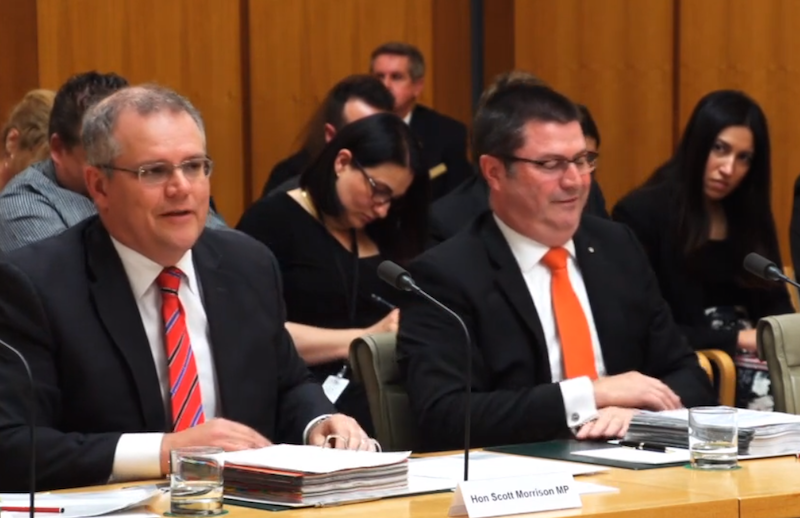A group of some of the nation’s most senior legal academics — including two deans of school — have written in support of Australian Human Rights Commission (AHRC) President Gillian Triggs, in the wake of a new round of criticism from senior government ministers.
In an open letter the 25 academics express concern about the nature of the criticism directed towards Triggs, who they describe as “one of Australia’s most respected independent public office holders”.
Included among the signatories are the University of Sydney’s Dean at the Faculty of Law, Joellen Riley, and the Griffith Law School Dean and Head of School, Penelope Mathew.
Triggs' most recent run-in with the Coalition came after Prime Minister Tony Abbott and ministers Scott Morrison and Peter Dutton lambasted the AHRC President for her recommendation that refugee John Basikbasik be compensated $350,000 after he was detained without charge for a period of seven and a half years.
After completing a sentence for the manslaughter of his wife, Basikbasik was not released back into the community and instead held in immigration detention. Efforts to deport him failed after an International Treaties Obligations Assessment found sending him to Indonesia would breach Australia’s non-refoulement obligations.
Despite failing to appeal the AHRC’s findings, Abbott decried the result as “bizarre”.
“I think it shows what can best be described as extremely questionable judgment,” he said.
The PM's comments were expanded upon by Dutton and Morrison.

But Triggs has drawn significant support from legal circles, with the most recent letter coming after the Australian Bar Association expressed its concern at the government’s response to the Basikbasik recommendations.
Anti-domestic violence organisation White Ribbon has also publicly backed Triggs’ findings.
The 25 co-signatories of the open letter describe the attacks on Triggs as “relentless” and warn they are founded on a misunderstanding of the AHRC’s obligations, and Triggs’ role as President.
“Independent public office holders are an important part of modern democratic societies,” the letter reads.
“Their task is to ensure accountability for abuses of power by government. Their capacity to perform this role depends on their independence and ability to act impartially.
“Independence and impartiality are undermined when a political leader publicly attacks holders of public office and when the media presents inaccurate accounts of the work of public institutions.”
The open letter was sent to The Australian newspaper on January 18, but did not receive a response, and appears to have gone unpublished.
Multiple attempts to contact the letters editor at The Australian by one of the authors of the letter went unanswered and, at the time of press, a request for comment from New Matilda had not drawn a response.
The newspaper has reveled in the government’s criticism, with Associate Editor Chris Kenny showing particular enthusiasm, taking jabs at Triggs on multiple platforms.
Gillian Triggs backs Indonesian wife-killer detainee http://t.co/Jn9F5MyWVj Triggs is a ripper.
— Chris Kenny (@chriskkenny) January 6, 2015
Kenny drew the Basikbasik case back to the children in detention inquiry, accusing Triggs of partisanship.
“She waited until the Coalition was in power, the boats had stopped and children were being moved out of detention before she launched this politically volatile inquiry,” he wrote.
On Sky News, the columnist also derided Triggs’ work at the inquiry as “emotional”.
Triggs was targeted by the Coalition throughout 2014 after heading the AHRC’s inquiry into children in detention, which heard damning evidence of the harm done by the hard-line asylum seeker policies of Labor and the Coalition.
The inquiry, which will have its final report tabled when Parliament returns next month, heard that under the Coalition senior medical staff had been asked to edit reports and supress evidence of the harm being done to children held in offshore detention.
Before taking the job as AHRC President in 2012 Triggs served as the Dean of the Faculty of Law at the University of Sydney.
In an op-ed published by Fairfax, Triggs hit back at her detractors, and pointed out her report had not recommended the unconditional release of Basikbasik into the community.
“It is understandable that some Australians find it hard to accept the recommendations of the Commission in cases where individuals seem undeserving,” Triggs wrote.
“This is especially so where a person whose freedoms have been denied has, in turn, egregiously breached the rights of others.”
“But those who commit a criminal offence, and serve the sentence provided by law, do not forfeit all their human rights for the future.”
“Indeed, it is a vital element of our modern criminal justice system that those who commit offences should have the opportunity to reintegrate into the community once their sentences have been served.”
The AHRC today said Triggs would not be adding further comment.
You can read the full text of the letter, complete with the 25 signatories, here.
Correction: this article initially stated Basikbasik murdered his wife. His conviction was for manslaughter.
Donate To New Matilda
New Matilda is a small, independent media outlet. We survive through reader contributions, and never losing a lawsuit. If you got something from this article, giving something back helps us to continue speaking truth to power. Every little bit counts.



